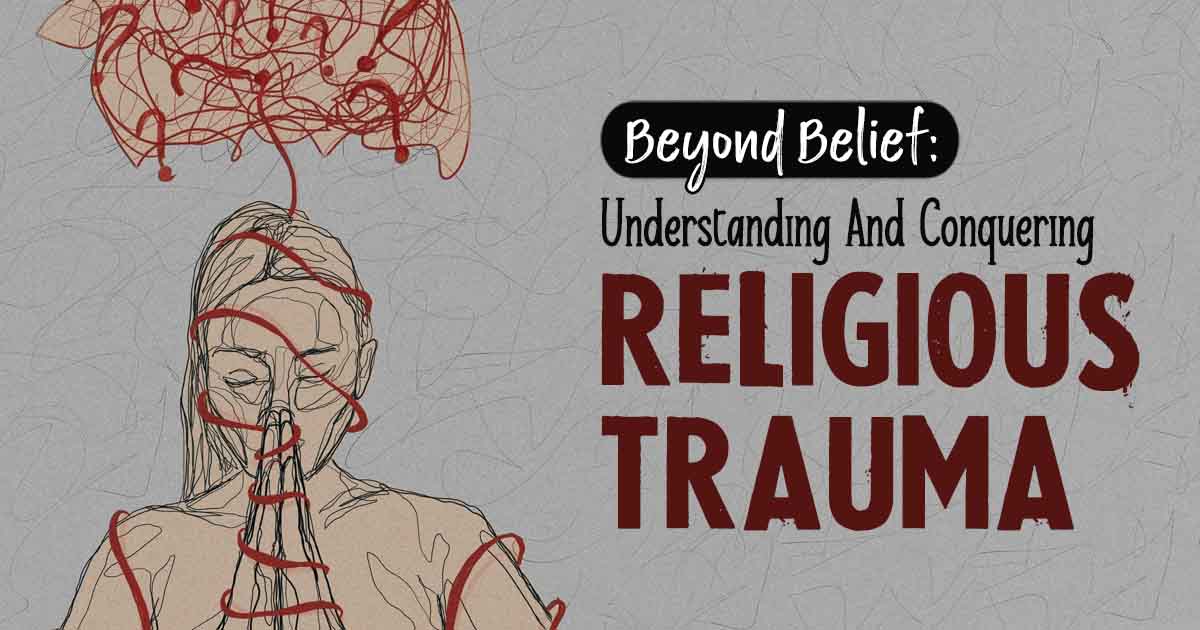Religious trauma is a mental health issue has gained recognition in recent years as individuals grapple with the profound and lasting impact of negative religious experiences on their mental health.
What is religious trauma?
Religious trauma is commonly referred to as the emotional and psychological wounds inflicted by negative religious experiences. It mainly arises when individuals face distressing or abusive practices within a religious context and, in the process, experiences a crisis in faith, identity, and humanity.
Unlike the more traditional types of trauma like PTSD, religious trauma syndrome is insidious. Its symptoms are often internalized by victims and, therefore, most of the time, it goes undetected or misdiagnosed.
Signs of religious trauma
Individuals who experience religious trauma may commonly exhibit:
- Anxiety
- Depression
- Guilt
- Traumatic memories and flashbacks
- Sleeplessness or sleep beset by nightmares
- An overwhelming fear of divine punishment.
- Persistent questioning of one’s self-worth
- A pervasive sense of shame ingrained through religious teachings
- Intrusive thoughts related to their religious upbringing
- Social withdrawal
- Other mental health issues like eating disorders, adjustment disorders, etc.

Causes of religious trauma
Religious trauma syndrome could be generated by several factors within any religious environment. Dogmatic and authoritarian religious teachings that stress on strict observance of doctrines, combined with punishments for even minor moral slip-ups, can create an environment in which trauma is likely to be afflicted. In fact, the common causes of religious trauma are often rooted in subtle manipulation, control, and fear perpetuated by religious authorities or communities.
In certain religious communities critical thinking is stifled and personal autonomy is suppressed, thus making for traumatic breeding grounds. In most cases, religious trauma accompanies homophobia or biases related to gendered ideologies.
Religious trauma and mental health
The intersection between religious trauma and mental health is complex. The emotional toll of religious trauma can manifest as anxiety disorders, depression, post-traumatic stress disorder (PTSD), substance abuse, self-harm, or even suicidal ideation.
The sense of guilt and shame internalized in religious trauma may lead to negative self-perception and attachment styles, impacting a person’s quality of life and ability to form healthy relationships. Moreover, the internal conflict resulting from one’s broken relationship with his/her faith may exacerbate pre-existing mental health conditions or trigger the onset of new ones.
Addressing religious trauma for sound mental health
Acknowledging religious trauma as a legitimate and widespread issue is the first step toward fostering sound mental health for survivors. Compassionate and trauma-informed therapy is always prescribed to people navigating religious trauma syndrome.
Another effective approach is cognitive-behavioral therapy (CBT), which helps individuals challenge and reframe negative thought patterns triggered by religious trauma. Additionally, exposure therapy can also be availed to help survivors confront and gradually desensitize themselves to triggering religious stimuli. Both therapies provide for a gradual and controlled process of internal healing.
Support groups and community networks also play a pivotal role in addressing religious trauma. Connecting with others who have experienced similar struggles fosters a sense of belonging and validates the survivor’s experiences. Peer support provides an avenue for sharing coping strategies, fostering resilience, and dismantling the isolation often felt by survivors of religious trauma.
Educational initiatives within religious communities are essential to preventing and addressing religious trauma. Encouraging critical thinking, promoting inclusivity, and challenging harmful religious teachings can contribute to creating environments that prioritize the mental well-being of their members. Religious leaders must also be equipped with the knowledge and empathy necessary to identify signs of trauma and offer appropriate support.
Lastly, fostering a dialogue between mental health professionals and religious leaders can bridge the gap between religious trauma and mental health care. Therapists, personally, should approach these cases with sensitivity, recognizing the unique challenges posed by the intertwining of religious identity and traumatic experiences.






